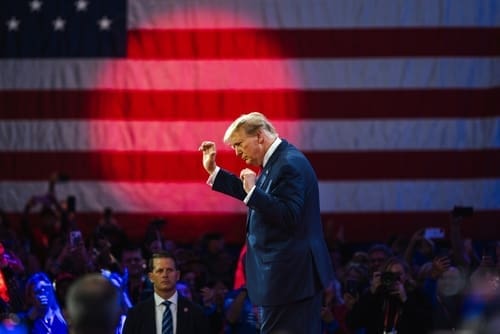
Global Markets React to U.S. Elections
As expected, last week brought a wave of significant developments impacting global investments, dominated by the U.S. elections, interest rate adjustments, and shifts in European politics. At this time, it appears likely that the Republican Party will secure control of both chambers of the U.S. Congress and the presidency, though the final results for the House of Representatives remain pending. Markets responded intuitively, with equities benefiting from the potential for less regulation and lower taxes.
However, there are some investor concerns worth noting. The unpredictability of President-elect Trump’s leadership could add to asset risk premiums, while potential tariffs may weigh on global growth. That said, markets seem to view a Trump presidency positively, focusing on potential growth through investment, much like during his first term.
Implications of Potential Tariffs and Policy Changes
Tariffs, according to economic theory, are a negative sum game. There may be winners and losers, but in aggregate, growth should be reduced – not least because typically, tariffs imposed by one country will be met by retaliatory tariffs. However, due to the U.S.’s current account deficit, tariffs are likely to reduce imports and therefore increase growth. While the U.S. equity market does not perfectly reflect the U.S. economy, and the same is true for most other regions to differing degrees, it still seems safe to believe that tariffs improve the outlook for U.S.-listed companies relative to the outlook for companies in other jurisdictions. The main burden of tariffs falls upon companies selling goods across borders, but in time, they’ll be able to mitigate this challenge if they can relocate their manufacturing to the U.S. and get behind the tariff barrier. Indeed, President-elect Trump sees them as a means to encourage foreign direct investment into the U.S.
That, alongside reduced environmental protection and regulation, is expected to provide a boost to growth through investment. This was reflected in gains for companies that will facilitate this investment. The costs of renewed global trade friction would fall on economies that are very open and run current account surpluses in goods. The Eurozone meets these criteria, so the election result is an undesirable development alongside a host of additional challenges the region is facing, such as the loss of gas supplies from Russia, and weakness in the Chinese export market.
So in summary, while tariffs often reduce global growth, they may positively impact U.S.-listed companies in the short term. Trump’s approach could encourage foreign investment within U.S. borders, with companies looking to mitigate tariff risks by relocating manufacturing domestically. This, along with a reduction in environmental regulations, is expected to drive growth, especially for U.S.-based investments. Conversely, European markets, particularly the Eurozone, face challenges due to open economies and current account surpluses, adding to existing pressures such as reduced energy supplies from Russia and slowing Chinese demand.
German Fiscal Policy: A Shifting Landscape
Germany’s political landscape has shifted considerably, with fiscal policy under debate amid coalition tensions. Recent events, including Chancellor Olaf Scholz’s dismissal of Finance Minister Christian Lindner and the impending early election, underscore a divide within German politics regarding government borrowing limits. The “debt brake” policy has broad support historically but faces scrutiny amidst pressing issues like climate action and military spending.
Ongoing Challenges for European and UK Services Sectors
Last week’s economic surveys offered an opportunity to test the health of different regions. They showed Europe still seems to be missing out on the ongoing global expansion in services activity, with the region’s weakness stemming from its core in France and Germany. Other parts of Europe have seen some improvement, and the U.S. remains the relative bright spot.
The UK saw only a slight moderation in services activity but has the prospect of higher employment taxation to wrestle with.
Interest Rate Adjustments: UK and U.S. Central Banks Respond
In response to evolving fiscal landscapes, both the Bank of England and the Federal Reserve cut rates by 0.25%. The Bank of England projects a cautious approach to further cuts, balancing recent tax changes with upcoming public spending. The Federal Reserve will monitor tax policies before determining further rate adjustments
Chinese Economic Outlook: Continued Caution
Looking to China, and its economic activity continues to underwhelm. Last week, all eyes were again on another political press conference following a meeting of the Standing Committee of the National People’s Congress. Hopes that further fiscal stimulus would be launched were again dashed. Instead, confirmation was given of a six trillion yuan plan to swap the expensive liabilities of local government financing vehicles for cheaper debt issued by the local government itself.
We are here to help
As independent financial advisers, we are here to help you navigate these developments, providing insights and tailored advice on managing your investments in changing markets. Please reach out if you’d like to discuss how these global trends might impact your personal financial goals or require guidance on potential adjustments to an existing portfolio.